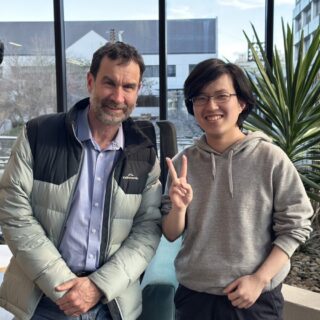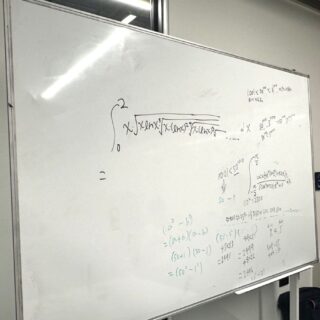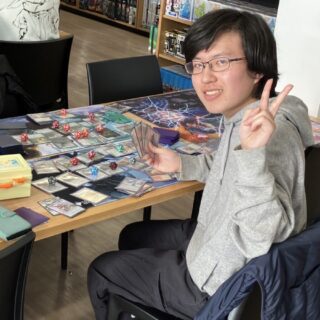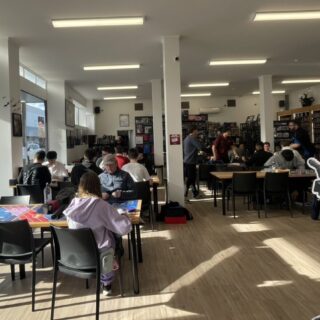朗報:芸、身を助ける
 芭蕉は、350年ほど前の7月13日に『 閑さや 岩にしみ入る 蝉の声 』と詠んだそうですが、今年の夏は温暖化の影響で、7月に入っても蝉が鳴かないと各地でニュースになっていました。そこから一か月、日本はまだまだ厳しい暑さかと思います。みなさま、いかがお過ごしでしょうか。地球の反対側から、国際理工学科3年の鴨下 麟太郎です。ニュージーランドに住む我々の生活は、そんな日本とは非常に対照的で、暖炉にて薪を燃やし、寒さをしのぐ毎日です。今回は、そんなニュージーランドの日常の中でも、国際高専サブカルチャー担当の僕の、非日常な日常を紹介していこうと思います。
芭蕉は、350年ほど前の7月13日に『 閑さや 岩にしみ入る 蝉の声 』と詠んだそうですが、今年の夏は温暖化の影響で、7月に入っても蝉が鳴かないと各地でニュースになっていました。そこから一か月、日本はまだまだ厳しい暑さかと思います。みなさま、いかがお過ごしでしょうか。地球の反対側から、国際理工学科3年の鴨下 麟太郎です。ニュージーランドに住む我々の生活は、そんな日本とは非常に対照的で、暖炉にて薪を燃やし、寒さをしのぐ毎日です。今回は、そんなニュージーランドの日常の中でも、国際高専サブカルチャー担当の僕の、非日常な日常を紹介していこうと思います。
みなさんがそうでないことは重々承知ですが、基本的に、僕の一日は数学の問題を解くことに始まり、数学の問題を解くことで終わります。国際高専にいるうちは、ロボコン(それが理由の大半ですが)や課題に追われ、祝日にしか解く時間はありませんでした。しかし、ニュージーランドに来ると、生活は一変しました。端的に言えば、一日に24時間を超える自由時間を手に入れることができたのです。これにより、夜、大体2~3時間ほど数学の勉強をして、それ関連の問題を1問選び、その問題を次の日の朝に解くという、どこかにありそうな勉強法のような生活を送れるようになったのです。ニュージーランドに着いてから、生活の中で数学のことを考えられる時間というのはすごく増えました。休日によくオタゴポリテクニクに行き、ホワイトボードに問題と解答プロセスを記載し、残したまま帰るという、さながらホームズの『踊る人形』のような形で、数学好きにのみ伝わる暗号を作っていたのですが、つい先日、数学の先生がその問題を見たようで、その話で盛り上がることができました。数学は言語だという人もいますが、まさに数学という言語で、コミュニケーションの漸近線を越えた瞬間でした。
-
Sharing a great moment with Mark Harmer, the inspiring math lecturer at Otago Polytechnic — we really hit it off!意気投合した、オタゴポリテクニクの数学担当教員、Mark Harmer先生と共に
-
A holiday spent with classmates, playing with an unsolvable expression — all that remains is a trace of our battle, like a dream. とある休日にて、クラスメイトと、解けない数式で遊んだ、”兵どもが、夢の跡”
サブカル担当と言っておきながら、ここまで数学の話しかしていないので、ここからは僕のダニーデンでのカードゲームライフについてご紹介していきます。
まず初めに、ニュージーランドにはカードをバラ売りしているお店がありません。「知らねぇよ」と思うかもしれませんが、これはカードゲーマーにとっては、死刑宣告に限りなく近い事実なのです。そのうえ、ダニーデンにはカードショップが1つしかありません。そのため、僕は5歳の頃から数えて、おそらく初めて、「カードゲームをしない月」を3か月過ごすことになります。
しかし、7月中旬、転機は訪れます。ある土曜日のことでした。その日はスケートをしに、友人と南部のスケートリンクに遊びに行っていました。その帰り道、たまたま見かけたそのカードショップの看板が、日本の有名なキャラクターだったのです。思わず目に留め、中に入ってそのカードゲームの商品を物色していると、店主さんが僕に話しかけてきてくれました。店主さんと話していると、毎週日曜日に大会が行われていることを教えてくれました。翌日、友人と共にその大会に参加し、人生初のカードゲーム国際交流ができました。
そこで、一つ驚きの事実が発覚しました。ニュージーランド人は、基本的に自由で、日本人とはベクトルの違う、言うなれば、「海外の人」の雰囲気がありますが、カードゲームコミュニティは、日本と全く変わりませんでした。周りと比べ強すぎるデッキを使えば嫌がられ、事故(運が悪く、目に見えて負けていること)った人には攻撃しないでおこうというような配慮などが見られ、インターネットでしばしば見かける、日本人と発言一致な「海外ニキ」は、日本人の仕込みではないことが分かりました。
-
A refreshing smile after a joyful day with friends and new local faces.友人と共に、初対面の現地人と遊びまくった日の清々しい笑顔
-
At the counter of a card shop. カードショップのカウンター
-
A packed play area full of energy.活気づく店内
ここまで、僕のニュージーランド生活についてお話してきましたが、最後に、このジャーナルを読んでいる白山麓キャンパスの学生や、入学を考えている中学生に向けて、メッセージを伝えて終わりにしたいと思います。このジャーナルを通して、僕が伝えたいのは、「英語能力は問われない」ということです。…盛りました。「コミュニケーション能力の方が重要だ」ということです。
僕は、電子ゲームやスポーツなど、人とつながれる定番の趣味を持っていません。しかも、若者と喋るのが好きではないという最悪のハンデを抱えています。それでも、日本で培った、先生と喋る技術とカードゲームで喋る技術で戦うことができています。この二つは、僕の言葉に耳を傾けてくれる瞬間が、自動的に訪れるという、すごくありがたい性質を持っています。みなさんもニュージーランドに来る前に、ニュージーランドでどうやって英語のコミュニケーションを取るかの戦略は立てた方がいいと思います。僕は日本人の家にホームステイしていて、英語を日常的には用いらないのですが、他の学生と比べても、英語に触れる頻度は変わりません。これは戦略勝ちとしか言いようがないです。ダニーデンは間違いなく、素晴らしい環境です。だからこそ、日本に帰りたいという欲望と見知らぬ天井との苦闘ではなく、「自分の成長の場」として捉えてほしいと思っています。
P.S. 信州人なので、本当は小林一茶にしたかったです。
鴨下 麟太郎

Breaking: Skills Do Save You
 About 350 years ago, on July 13th, the famous poet Matsuo Basho wrote the haiku:
About 350 years ago, on July 13th, the famous poet Matsuo Basho wrote the haiku:
“How still it is here—
Stinging into the stones,
The locusts' trill.”
But according to the news this year, because of global warming, people in many places said that cicadas did not sing even after July began. Now, one month later, Japan is still in the grip of a very hot summer, I believe. How are you all doing? From the other side of the Earth, I am Rintaro Kamoshita, a 3rd year student at International College of Technology, Kanazawa.
Our life in New Zealand is very different—almost the exact opposite—from the summer in Japan. Every day we burn firewood in the fireplace to fight the cold. Today, I would like to tell you about my “unusual daily life” here in New Zealand, especially as the person who is sometimes called the “subculture manager” of our school.
First, I know you may not be the same, but for me, a day usually begins with solving a math problem, and ends with solving another math problem. When I was in Japan, at ICT, I did not have much time for such study, because I was busy with Robot Contest preparation and with many assignments. Only on holidays could I do math freely. However, after coming to New Zealand, my life changed a lot. Simply put, I gained “more than 24 hours of free time in one day.” Because of this, I could make a new style: at night, I study math for two or three hours and choose one problem, and then I try solving that problem the next morning. Thanks to this, I now have a lot more time to think about math in my daily life here.
On holidays, I often go to Otago Polytechnic. There, I write a math problem and its process of solution on a whiteboard, and leave it there before going home. It was like creating a secret code that only those who love math could understand—much like the one in Sir Arthur Conan Doyle’s The Dancing Men. Recently, one math teacher saw my problem and we were able to talk about it. Some people say that “math is a language.” I felt that it was really true, because at that moment, we crossed the boundary of ordinary communication by using the language of math.
-
Sharing a great moment with Mark Harmer, the inspiring math lecturer at Otago Polytechnic — we really hit it off!意気投合した、オタゴポリテクニクの数学担当教員、Mark Harmer先生と共に
-
A holiday spent with classmates, playing with an unsolvable expression — all that remains is a trace of our battle, like a dream. とある休日にて、クラスメイトと、解けない数式で遊んだ、”兵どもが、夢の跡”
But since I am supposed to talk about subculture, I should now speak about my “card game life” in Dunedin. First, let me tell you something surprising: in New Zealand, there are no shops that sell single cards. You may think “so what?” but for card gamers, this is almost like a death sentence. What is worse, in Dunedin, there is only one card shop in the whole city. Because of this, I had to spend three months without playing card games. This was maybe the first time since I was five years old.
However, in mid-July, something changed. One Saturday, I went skating with my friends at the southern ice rink. On the way back, I found a card shop, because I saw a sign with a very famous Japanese character. I went inside and looked at the card products. Then the shop owner talked to me, and told me that every Sunday they have a tournament. The next day, I joined the tournament with my friend, and I had my first international card game exchange.
There, I found something surprising. In general, New Zealand people are very free, and their way of thinking is different from Japanese people. But in the card game community, everything was almost exactly the same as in Japan. For example, if someone used a very strong deck, other players did not like it. And if someone was very unlucky and already almost losing, other players tried not to attack too hard. On the internet, I often saw people saying “foreign players act just like Japanese ones.” I found out that this was true.
-
A refreshing smile after a joyful day with friends and new local faces.友人と共に、初対面の現地人と遊びまくった日の清々しい笑顔
-
At the counter of a card shop. カードショップのカウンター
-
A packed play area full of energy.活気づく店内
Now, I want to finish my journal with a message to the students in the Hakusanroku Campus, and also to junior high school students who are thinking of entering our school. What I want to say is this: English ability is not the most important thing. …Okay, maybe I exaggerated. What I really mean is: communication ability matters much more.
I don’t play popular games, or popular sports. Also, I do not enjoy speaking with young people very much. In other words, I have some serious handicaps. But even so, I can still “fight,” thanks to two things I learned in Japan: the skill of talking with teachers, and the skill of talking through card games. These two skills have a special power: they automatically create a moment when the other person listens to me. So I recommend that you also make a strategy about how to communicate in English before you come to New Zealand.
For example, I live in a homestay with a Japanese family, so in daily life I do not use much English. But still, compared with other students, the amount of English I touch is not any less. That is, I can say I won by strategy. Dunedin is truly a wonderful place. So I hope you can make it not a place of suffering and homesickness, but a place of your own growth.
P.S. Actually, I am from Shinshu, so I wanted to start with Kobayashi Issa, not with Matsuo Basho.
Rintaro Kamoshita














